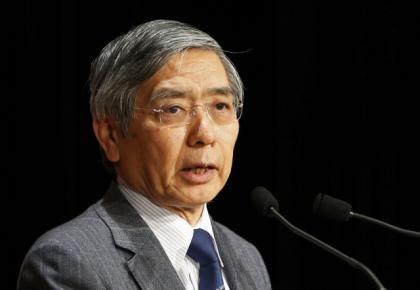BOJ Offers Brighter View On Global Growth, Keeps Policy Stea
Bareksa • 13 Jun 2014

Bank of Japan Governor Haruhiko Kuroda speaks during a seminar in Tokyo (REUTERS/Yuya Shino)
The ECB last week became the first major central bank to impose negative interest rates
Bareksa.com - The Bank of Japan kept monetary policy steady on Friday and offered a slightly more upbeat view on overseas growth, signalling confidence the economy is on course to meet its inflation target next year without additional stimulus.
Markets are focusing on what Governor Haruhiko Kuroda has to say later in the day about measures taken by the European Central Bank last week to ease pressure on the strong euro and fend off the risk of a Japan-style deflation.
The BOJ is increasingly convinced the world's third-largest economy will continue its modest recovery, with companies ramping up capital spending and consumer confidence holding up despite the pain from a recent sales tax hike.
Sluggish exports remain a soft spot for the economy, however, although BOJ officials see overseas headwinds receding as China's exports rebound and as the U.S. economy recovers from a severe winter.
"Overseas economies, mainly advanced economies, are recovering, although lackluster performances are seen in some areas," the central bank said.
That was a slightly brighter view than last month, when it said global growth was "starting to recover" albeit with lacklustre performances in some areas.
As widely expected, the BOJ maintained its monetary policy framework, under which it has pledged to increase base money by 60-70 trillion yen ($588-$686 billion) per year via aggressive asset purchases.
The central bank also left unchanged its assessment that Japan's economy continues to recover moderately as a trend, while exports have been "more or less flat."
The ECB last week became the first major central bank to impose negative interest rates, or charge financial institutions for parking funds at the central bank, a move markets see as partly aimed at keeping euro gains in check.
Some in the BOJ, who have been surprised by the unusually blunt language ECB officials have been using to rein in euro rises, were relieved to see that the ECB's policy action did not lead to a sharp yen rebound against the euro.
Both the ECB and the BOJ argue that their monetary policies do not directly aim at influencing currencies. But they do prefer their currencies to weaken because that will push up prices and give their exports a competitive advantage overseas.
At his post-meeting news conference at 0630 GMT, Kuroda may repeat a comment he made last month that he sees no clear reason for the yen to strengthen, particularly against the dollar, with the BOJ maintaining its huge stimulus even as the U.S. Federal Reserve tapers its asset purchases.
Japan logged its fastest growth in two years in the first quarter thanks to surprisingly strong capital spending, in a fresh sign that the economy is in better shape to weather the hit from the sales tax hike in April.
With consumer inflation having exceeded 1 percent, Kuroda is likely to reiterate that Japan is making steady progress toward meeting the BOJ's 2 percent target during the fiscal year beginning in April 2015.
Kuroda's optimism has led market players to scale back bets of further monetary easing this year, though many economists remain sceptical that prices will continue to pick up.
Under an intense burst of stimulus launched in April last year, the BOJ pledged to double base money via aggressive asset purchases to end deflation and accelerate consumer inflation to 2 percent in roughly two years. (Source : Reuters)